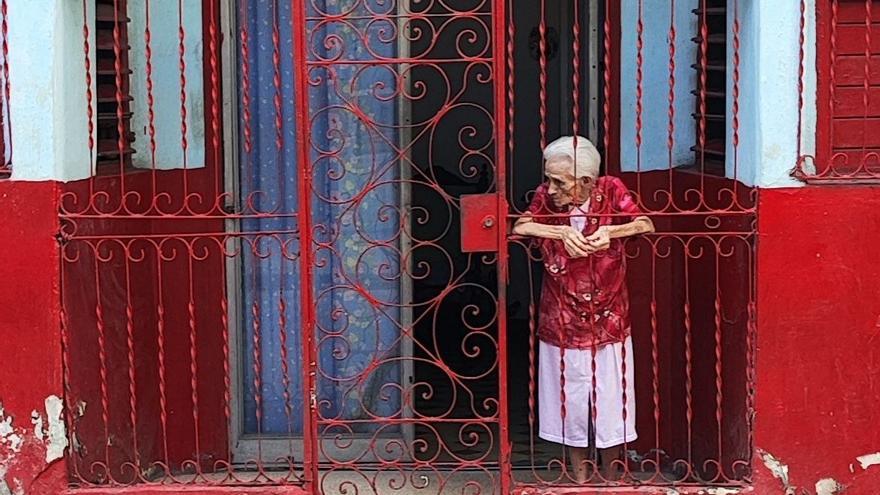
![]() 14ymedio, Havana, 27 December 2023 — Hundreds of thousands of Cubans have been able to leave the country for the United States during 2023 thanks to humanitarian parole; another tens of thousands are Spain-bound thanks to the new Democratic Memory Law. As the country empties, the streets are left with citizens whose faces are increasingly poorer, increasingly older, increasingly hopeless.
14ymedio, Havana, 27 December 2023 — Hundreds of thousands of Cubans have been able to leave the country for the United States during 2023 thanks to humanitarian parole; another tens of thousands are Spain-bound thanks to the new Democratic Memory Law. As the country empties, the streets are left with citizens whose faces are increasingly poorer, increasingly older, increasingly hopeless.
If that face had to be given only one color, it would undoubtedly be dark. Because the most unfortunate people in Cuba have always been the same, before and after 1959 and until now, in the middle of the unstoppable stampede: the black population.
They are evident in any city in Cuba, in the lines at increasingly scarce grocery stores, sitting on sidewalks begging for money, rummaging through garbage containers. Long ago, many of them served the regime with enthusiasm, but today, the Revolution, inexorably failed, turns its back on them and leaves them to their fate, like stray dogs.
Others are neither black nor elderly, but, even so, they have not wanted or been able to leave Cuba. Ernesto, a resident of Central Havana in his 40s, has a difficult time because he has no one to ask for “sponsorship” from the United States or from Spanish ancestors to qualify for the “grandchildren law.” A once-successful musician, not only in the theater, but in tourist shows, he survives by doing different jobs, such as delivering food for private businesses. He lives in a precariously balanced building, but he has no money or way to move out. He relies on his natural strength and some faith in something else. “I always say that God has to have something in store for me, I don’t know what, but I have to stay here.”
Emigration was very close in the case of Alberto, a 22-year-old young man from Cienfuegos, but it has not been possible yet. He signed up, together with his parents and his brother, for the Humanitarian Parole in the month of January, when the program was announced to go into effect. Last April, his family received notification that they had been accepted, but his name was not included in the email in which they were told the good news. He is still in Cuba, but now, instead of living in the old manor house that belonged to his grandparents, he is staying at an aunt’s house, sleeping on her couch, since his parents sold their house before leaving.
Alberto’s family, with whom he speaks twice a day, insists that he must wait for his case to be resolved, but in recent weeks he has considered leaving by way of Nicaragua or using other means to emigrate. For the first time in his life, he will spend Christmas without his parents and his brother, who avoid sending him photos of the celebrations they are already having in exile in Miami, so as not to feed him the sparrow of nostalgia.
Emelia, a 78-year-old Public Health retiree, feels “still strong” but she does not plan to emigrate. Her two daughters and her granddaughters have left in the last two years, either to the United States or Spain, but she does not want to be a burden on them at a time when they are still “taking off” on their migratory path.
Another reason Emilia is that she is reluctant to leave the family home, which has been left under her sole care. The house that her parents bought when they got married and where she was born is located near Calzada del Cerro, in Havana. Although she could still sell it and use the money to buy “an apartment like a doll’s house, with new everything,” she considers herself the guardian of the family legacy. These rainy days, the leaks have not allowed her to sleep in the first room of the house, but she has four more… all empty.
The vast majority of emigrants are young people, professionals or small businessmen, those who the Cuban Government did not allow to flourish, or who were directly harassed and persecuted for being difficult. All of them are the work force, the drive and the motor, that countries other than the one where they were born are already benefitting from. The joy for each Cuban citizen who achieves freedom leaves a bitter question: who will be left to build a new Cuba?
____________
COLLABORATE WITH OUR WORK: The 14ymedio team is committed to practicing serious journalism that reflects Cuba’s reality in all its depth. Thank you for joining us on this long journey. We invite you to continue supporting us by becoming a member of 14ymedio now. Together we can continue transforming journalism in Cuba.
